Carey Bell Harrington
b. November 14th, 1936 in Macon (Mississippi)
d. May 6th, 2007 in Chicago (Illinois)
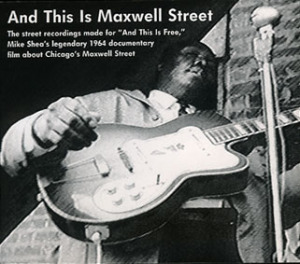
AND THIS IS MAXWELL STREET
P-Vine
Rooster
September 1964
Arrivé en septembre 1956 à Chicago dans les bagages de son beau-père pianiste Lovie Lee, il devient un habitué de la 26ème rue où il joue plusieurs mois durant. Corey suit les leçons de Little Walter qui lui a été présenté par David "Honeyboy" Edwards. Avec Edwards, il est, ensuite, l'attraction régulière du Cadillac Baby's Bar sur la 47ème rue pendant un an et demi. En parrallèle, il apprend la guitare basse pour accompagner Big Walter Horton puis Johnny Young. Alors qu'il joue avec ce dernier sur le marché ouvert de Maxwell Street, il est remarqué par Charlie Musselwhite, Paul Butterfield et Mike Bloomfield qui l'aident à lancer sa carrière. Malgré un son parfois moyen, cet album est un document historique : le témoignage de ce que pouvait être le marché de Maxwell Street quand les meilleurs bluesmen s'y produisaient. A ce titre, la prestation de Carey Bell ce jour de septembre 1964, accompagné par Robert Nighthawk, est remarquable ("Carey'n on" et "Cruisin' in a Cadillac" démontrent déjà son immense talent à l'harmonica). Un document exceptionnel.
Arrived in september 1956 in Chicago, with his stepfather pianist Lovie Lee, he became a regular artist at 26th Street where he plays several months. Corey follows lessons from Little Walter who was introduced to him by David "Honeyboy" Edwards. Then, with Edwards, he is the regular attraction at Cadillac Baby's Bar on 47th Street for a year and a half. In the same time, he learned the bass guitar to accompany Big Walter Horton and Johnny Young. While playing with him on the Maxwell Street market, he was spotted by Charlie Musselwhite, Paul Butterfield and Mike Bloomfield who helped him to launch his career. Despite its sometimes average sound, this album is an historical document : the testimony of what could be the Maxwell Street market when the best bluesmen performed there. As such, the performance of Carey Bell that day in september 1964, accompanied by Robert Nighthawk is remarkable ("Carey'n on" and "Cruisin' in a Cadillac" already demonstrating his immense talent on harmonica). An exceptional document.
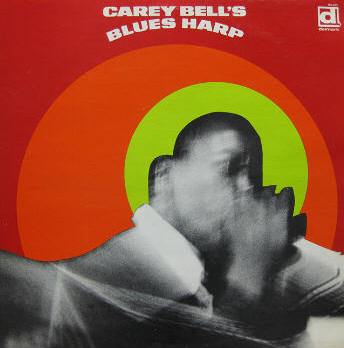
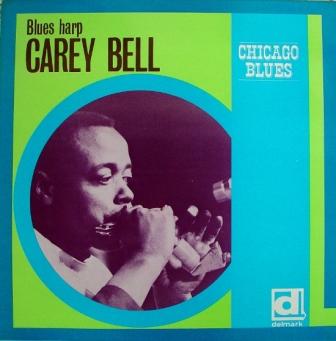
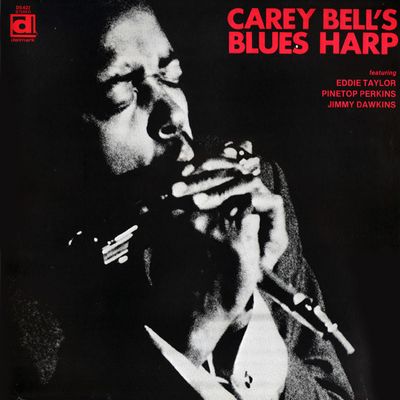
CAREY BELL'S BLUES HARP
Delmark
February - May 1969
Habitant les quartiers du West Side depuis 1963-64, son immeuble est incendié lors des émeutes d'avril 1968. Carey et sa famille en réchappent mais ils ont tout perdu. Ayant un pressant besoin d'argent, il part en tournée avec Earl Hooker et enregistre même un titre en leader ("Love ain't a plaything" en novembre 1968) pour Arhoolie. C'est encore Musselwhite qui présentera Robert Koester à Carey. Celui-ci, séduit, lui fait enregistrer ce premier album. A ce moment là, Carey est, donc, déjà un musicien de studio aguerri qui a travaillé aussi avec Robert Nighthawk ou "Sleepy" John Estes. Sur ce premier disque, on sent encore l'influence prépondérante de Little Walter (il lui reprend, d'ailleurs, plusieurs titres). Sa voix manque encore un peu d'ampleur et d'aisance mais son jeu d'harmonica est déjà très au point (Carey est un adepte de l'harmonica chromatique). Plusieurs morceaux sortent du lot : "I wanna will my love to you", "I cry so much", "Sad dreams" (où il prend un lumineux solo) et les instrumentaux "Rockin' with a chromatic" et, surtout, "Blue monday at Kansas City Red's". Quelques rares longueurs jalonnent l'ensemble comme la chanson-titre peu percutante. Néanmoins, il s'agit d'un superbe premier disque. Dans chaque séance constitutive de celui-ci (février et mai 1969), il y a un guitariste différent : Jimmy Dawkins dans la première et Eddie Taylor dans la seconde. Dans une interview de 1999 donnée au magazine Soul Bag, Carey confiait ne pas aimer cet album pour lequel il estimait n'avoir pas eu assez de temps en studio.
Residing in the West Side neighborhoods since 1963 to 1964, his building was burned during the april 1968 riots. Carey and his family have survived but they have lost everything. Having an urgent need of money, he toured with Earl Hooker and even recording a title as a leader ("Love is not a plaything" in november 1968) for Arhoolie. Musselwhite introduced Carey to Robert Koester who made him record his first album. At that time, Carey is already a skilled studio musician who has also worked with Robert Nighthawk or "Sleepy" John Estes. On this first album, you can still feel the overwhelming influence of Little Walter (he covers several titles of Walter). His voice still lacks a bit of depth and ease but his harmonica playing is already well developed (Carey is an adept of the chromatic harmonica). Several tracks stand out : "I wanna will my love to you", "I cry so much", "Sad dreams" (where he takes a brilliant solo) and the instrumental "Rockin' with a chromatic" and especially "Blue monday at Kansas City Red's". Few lengths like the tedious title song. Nevertheless, it is a great first album. In each session (february and may 1969) , there is a different guitarist, Jimmy Dawkins in the first and Eddie Taylor in the second. In a 1999 interview given to the Soul Bag magazine, Carey told dislike this album for which he felt he had not had enough time in the studio.
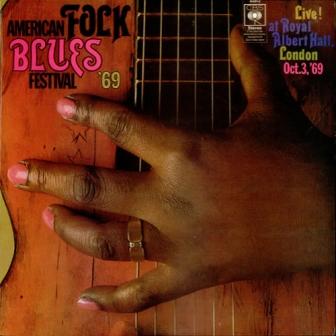
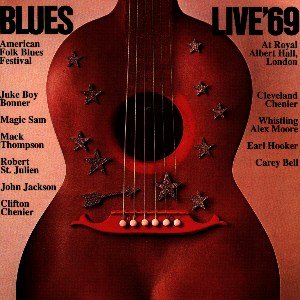
AMERICAN FOLK BLUES FESTIVAL '69
CBS
L+R
October 1969
Pour l'édition de l'American Folk Blues Festival de 1969, la programmation fut confiée à Chris Strachwitz. Celui-ci privilégia les artistes de son label Arhoolie (Earl Hooker, "Juke Boy" Bonner, John Jackson, Clifton Chenier) mais invita aussi Magic Sam. Carey Bell, alors membre de l'orchestre d'Hooker, fut naturellement invité et participa en tant qu'accompagnateur et en tant que leader. Le disque est capté lors de la représentation au Royal Albert Hall de Londres au début d'une tournée à travers l'Europe qui durera tout le mois d'octobre 1969. En leader, on l'entend sur un beau medley mi-lent mi-rapide et il accompagne Earl Hooker sur deux morceaux (dont le superbe "Blue shadows fall").
For the American Folk Blues Festival 1969 edition, supervision was given to Chris Strachwitz. He chose artists from his Arhoolie label (Earl Hooker, "Juke Boy" Bonner, John Jackson, Clifton Chenier), but also invited Magic Sam and Carey Bell (then-member of Hooker band), who participated as a sideman and as a leader. The disc is captured during performance at the Royal Albert Hall in London at the beginning of the european tour that will last throughout the month of october 1969. As a leader, you heard him on a beautiful mid-fast mid-slow medley and accompanied Earl Hooker on two songs (including the superb "Blue shadows fall").
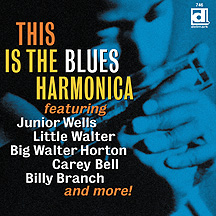
THIS IS THE BLUES HARMONICA vol.1
Delmark
January 1972
Dans cette compilation, on trouve un titre inédit de Carey Bell : l'excellent instrumental "Deep down south".
In this compilation, we find an unissued title by Carey Bell : the excellent instrumental "Deep down south".
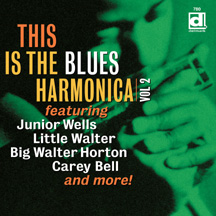
THIS IS THE BLUES HARMONICA vol.2
Delmark
January 1972
Un autre sympathique instrumental inédit dans cette compilation : "Carey's rhumba" (avec un thème principal emprunté à Muddy Waters).
Another nice unissued instrumental in this compilation : "Carey's rhumba" (with a main theme borrowed from Muddy Waters).
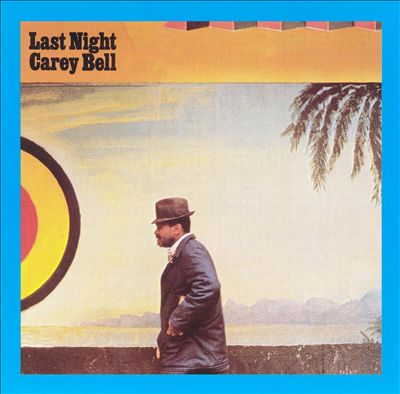
LAST NIGHT
Bluesway
1972
Pour replacer cet opus dans son contexte, Carey venait juste de quitter le poste d'harmoniciste de Muddy Waters qu'il avait tenu en 1970-71 et était en train de devenir un session-man très demandé. Enregistré en 1972 en quelques heures pour Bluesway avec le producteur Al Smith, le disque est dédié à sa femme Dorothy (sa seconde femme après Sally Kate) avec laquelle il s'est marié en juin 1966. Comme le titre l'indique, Carey reprend encore une fois le "Last night" de Little Walter comme dans son précédent opus. Sa version est, encore une fois, magnifique. A mon avis, la production et le mixage sont plus réussis que sur son disque Delmark : les instruments ressortent mieux et le son parait plus clair. L'orchestre, attentif et précis, est composé d'Eddie Taylor (guitare), Pinetop Perkins (piano), Dave Myers (basse) et Willie "Big Eyes" Smith (batterie). Le disque est dominé par un chef d'oeuvre, l'instrumental "Rosa I love your soul" superbe de feeling. Mais la plupart des morceaux mériterait d'être cité tant l'ensemble est de très haut niveau : "Taking you downtown", "Tomorrow's night" et les rapides "Cho cho blues" et "Leaving in the morning". On notera aussi "I want to see you tomorrow night" démarquage du "Everything gonna be alright" de Little Walter. Le texte de pochette est dû à la plume de Carey lui-même (c'est quasiment le même que son texte sur le disque Delmark).
At that time, Carey had just left the Muddy Waters band and was becoming a very skilled session-man. Recorded in 1972 in a few hours session for Bluesway with producer Al Smith, the album is dedicated to his wife Dorothy (his second wife after Sally Kate) with whom he married in june 1966. As the title suggests, Carey covers again Little Walter's "Last night" as in his previous album. His version is, once again, beautiful. In my opinion, production and mixing are more efficient here than in his Delmark record : instruments stand out better and sound seems clearer. The backing band, careful and precise, is composed by Eddie Taylor (guitar), Pinetop Perkins (piano ), Dave Myers (bass) and Willie "Big Eyes" Smith (drums). The album is dominated by a masterpiece, the instrumental "Rosa I love your soul" with superb feeling. But most of the songs deserve to be cited as the whole album is very high : "Taking you downtown" , "Tomorrow's night" and fast tracks like "Cho cho blues" and "Leaving in the morning". Note also "I want to see you tomorrow night" transformation of Little Walter's "Everything gonna be alright". The sleeve text is penned by Carey himself (it is almost the same text as in Delmark album).
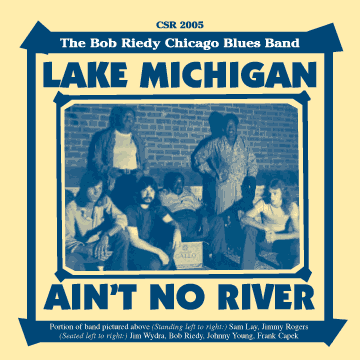
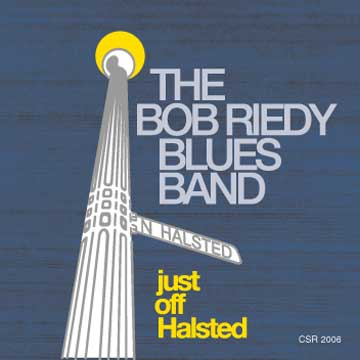
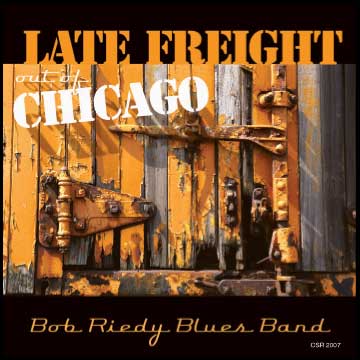
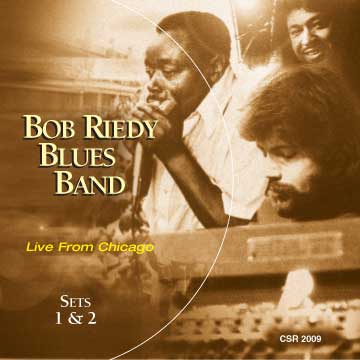
LAKE MICHIGAN AIN'T NO RIVER
Rounder
JUST OFF HALSTED
Flying Fish
LATE FREIGHT
RMR
LIVE FROM CHICAGO
CSR
1972 - 1978
Le pianiste Bob Riedy organisa plusieurs shows au milieu des années 70 qui permettaient à de nombreux bluesmen de se produire sur scène et de graver quelques morceaux. Il peut paraitre curieux de faire figurer ces enregistrements dans une discographie consacrée à Carey Bell puisque ce sont, en fait, des disques de Bob lui-même. Mais, Carey y est extrêmement présent et dans une forme éblouissante comme la plupart des autres musiciens d'ailleurs. L'occasion est, donc, trop belle de déterrer ces vénérables disques. Carey est présent sur les quatre disques présentés ici. Il existe en plus le double CD "Chicago blues shows of the 70's" qui est une compilation éditée par CSR (Chicago Sound Records), une structure fondée par Bob Riedy. Ce petit corpus, imparfaitement réédité en CD, mériterait d'être redécouvert tant la qualité de ces disques est d'une constante excellence.
Pianist Bob Riedy organized several shows in the mid-70's that allowed many bluesmen to perform on stage and cut a few tracks. It may seem odd to include these records in a discography devoted to Carey Bell since they are, in fact, albums of Bob himself. But Carey is extremely present and in sparkling form as most other musicians. Therefore, the opportunity is too good to dig up those venerable records. Carey is present on four discs presented here. In addition, there are one more double-CD "Chicago blues shows of the 70's" which is a compilation published by CSR (Chicago Sound Records), a structure founded by Bob Riedy. This small corpus, imperfectly reissued on CD, deserves to be rediscovered as the quality of these discs is constantly excellent.
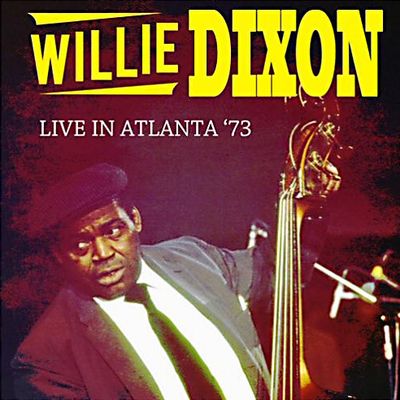
LIVE IN ATLANTA
Vintage Masters
April 1973
Carey Bell fut l'harmoniciste du Chicago All Stars de Willie Dixon avec lequel il tourna régulièrement au début des années 70 . Dans ce sympathique concert, il chante sur quelques titres dont "Everything is gonna be alright" et "It's so easy to love you".
Carey Bell was the harmonica player for Willie Dixon's Chicago All Stars with whom he toured regularly in the early 1970's. In this nice concert, he sings on a few songs including "Everything is gonna be alright" and "It's so easy to love you".
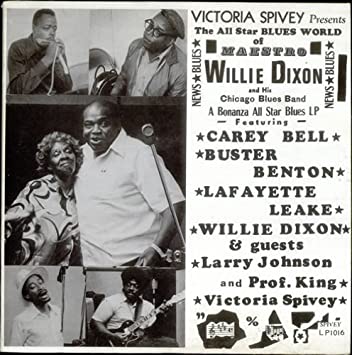
THE ALL-STARS BLUES WORLD OF MAESTRO WILLIE DIXON
Spivey
August 1973
Témoignage du Chicago All-Stars Band mené par Willie Dixon datant de 1973. Carey y exécute deux beaux morceaux en leader ("When the evening sun goes down" et "One day you're going to get lucky") parfaitement accompagné par un groupe ultra-compétent (Buster Benton, Lafayette Leake, Willie Dixon). Ce microsillon n'a jamais été réédité en CD.
Performance of Chicago All-Stars Band led by Willie Dixon from 1973. Carey is represented by two beautiful tracks as a leader ("When the evening sun goes down" and "One day you're going to get lucky") perfectly accompanied by an ultra-competent group (Buster Benton, Lafayette Leake, Willie Dixon). This LP has never been reissued on CD.
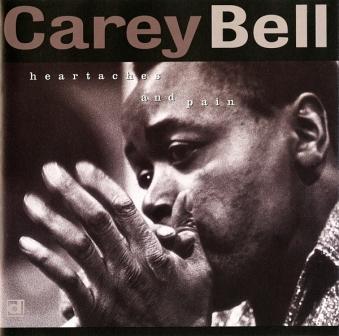
HEARTACHES AND PAIN
Delmark
March 1977
En mars-avril 1977, Henry Stone, propriétaire du label TK, charge le producteur Ralph Bass de superviser une série de dix albums de Chicago Blues. Le cahier des charges est simple : huit morceaux par artistes et peu (ou pas) de secondes prises. Tout devait être mis en boite en quelques heures. Mais, finalement, Stone abandonnera rapidement le projet et le matériel sera revendu à la maison anglaise Red Lightnin' en 1984. Plus tard, Delmark acquit les droits de ces bandes et les proposent en CD. A l'époque de cette séance de mars 1977, Carey vient de céder sa place au sein de l'orchestre de Willie Dixon (remplacé par le jeune Billy Branch) et a longuement collaboré avec le pianiste Bob Riedy sur scène et en studio. Le groupe très homogène est emmené par une section rythmique très au point (Aron Burton et Sam Lay). Son fils Lurrie, dont c'est la première apparition sur disque, montre qu'il est un bon guitariste en devenir. On remarque un bouquet de superbes instrumentaux particulièrement stimulants comme "Black-eyed peas", "Carey Bell rocks" et "Capri crash". Le magnifique blues lent "So hard to leave you alone" est certainement l'un des meilleurs moments de la séance.
In march - april 1977, Henry Stone, owner of TK label asks the producer Ralph Bass to oversee a ten albums serie of Chicago blues. Requirement is simple : eight tracks by artists and no (or very few) second take. Everything had to be completed in a few hours. But, ultimately, Stone quickly left the project and the material will be sold to the english Red Lightnin' in 1984. Later, Delmark acquired the tapes rights and issued a CD. At the time of this session in march 1977, Carey has gave up his place in Willie Dixon band (replaced by young Billy Branch) and has long collaborated with pianist Bob Riedy on stage and in studio. The backing band is very homogeneous and is led by an effective rhythm section (Aron Burton and Sam Lay). His son Lurrie, his first appearance on record, shows that it is becoming a good guitarist. A bunch of beautiful and stimulating instrumental like "Black-eyed peas", "Carey Bell rocks" and "Capri crash". The magnificent slow blues "So hard to leave you alone" is definitely one of the highlights of the session.
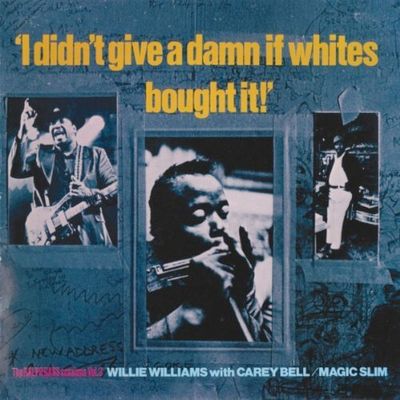
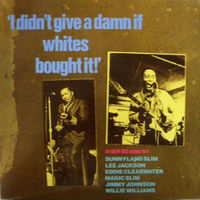
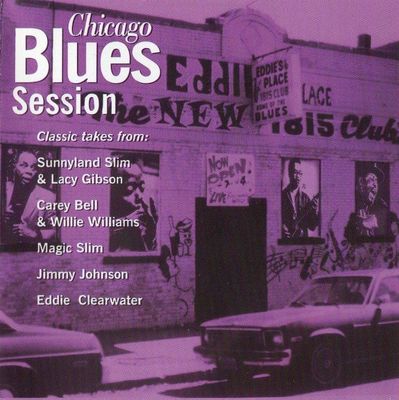
I DIDN'T GIVE A DAMN IF WHITES BOUGHT IT vol. 3 & 4
Red Lightnin'
CHICAGO BLUES SESSION
Sequel
March 1977
Il s'agit des recueils regroupant un reliquat des sessions de Ralph Bass detenu par Red Lightnin' et édité en CD par Sequel. Carey est, ici, associé au batteur-chanteur Willie Williams. Les six morceaux sont relativement intéressants mais sont souvent desservis par le chant médiocre de Willie Williams. Les notes de pochette indiquent que la séance eut lieu le 17 mars 1977 soit deux jours après la séance du disque "Heartaches and pain".
Compilations of Ralph Bass remaining sessions detained by Red Lightnin' and published on CD by Sequel. Carey is here associated with the singer-drummer Willie Williams. The six sides are quite interesting but are often poorly served by the voice of Willie Williams. The sleeve notes indicates that the session took place march 17, 1977 two days after the session for "Heartaches and pain".
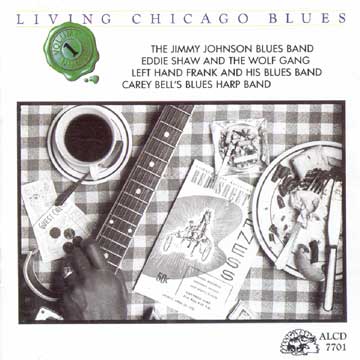
LIVING CHICAGO BLUES vol.2 (LP) / vol.1 (CD)
Alligator
1978
Dans la célèbre série supervisée par Bruce Iglauer pour documenter la scène chicagoane de l'époque co-financée par Alligator et Sonet, Carey Bell est présent deux fois : une fois en leader, l'autre fois accompagnant son beau-père Lovie Lee. Accompagné par un groupe familier (Lurrie Bell, Bob Riedy, Aron Burton, Odie Payne Jr), il reprend magnifiquement le "Too late" de Willie Dixon. Ses trois autres morceaux sont aussi remarquables et sa prestation reste une des plus abouties de cette anthologie.
In the famous series supervised by Bruce Iglauer to document the Chicago scene co-financed by Alligator and Sonet, Carey Bell is present twice : once as a leader, the other time accompanying his stepfather Lovie Lee. Accompanied by a familiar backing band (Lurrie Bell, Bob Riedy, Aron Burton, Odie Payne Jr.), he covered magnificently "Too late" by Willie Dixon. His other three tracks are also remarkable and remain one of the best artist featured in this anthology.
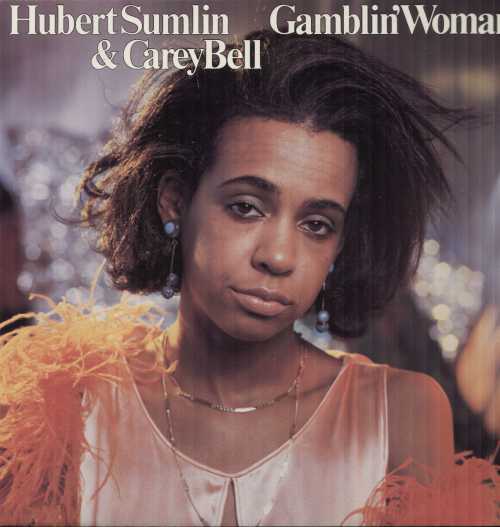
GAMBLIN' WOMAN
L+R
January 1980
Le microsillon L+R (avec sa pochette kitsch) mentionnait bien Hubert Sumlin & Carey Bell. Pourtant, la réédition en CD par Bellaphon n'est plus attribuée qu'à Hubert seul (avec une pochette trompeuse laissant supposer un disque de blues électrique alors qu'il s'agit de séances acoustiques). Cette session acoustique s'est déroulée aux studios Odyssey Sound à Chicago sous la houlette d'Horst Lippmann. Celle-ci, vraisemblablement sans ligne directrice, semble complètement improvisée. Le plus souvent, Carey joue les utilités derrière un Hubert Sumlin en flagrant manque d'inspiration. Ennuyeux voire exécrable.
The L+R LP (with its kitsch cover) announce Hubert Sumlin & Carey Bell. However, the reissue on CD by Bellaphon is attributed to Hubert alone (with a lying cover suggesting an electric blues album when it is actually acoustic sessions). This acoustic session took place in the Odyssey Sound studios in Chicago under the leadership of Horst Lippmann. This, presumably without guideline seems completely improvised. Most often, Carey plays utilities behind Hubert Sumlin in flagrant lack of inspiration. Boring.
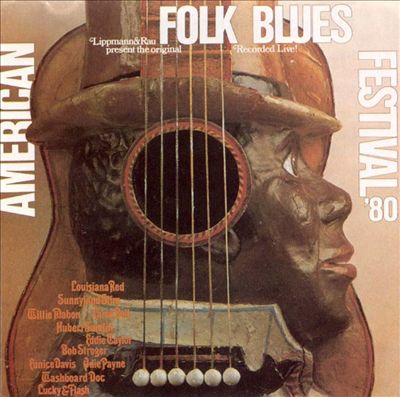
AMERICAN FOLK BLUES FESTIVAL '80
L+R
April - May 1980
Capté lors de concerts allemands d'avril-mai 1980, cet enregistrement symbolise la renaissance de l'American Folk Blues Festival après plusieurs années d'absence. Carey y est représenté par trois bons morceaux en leader puis deux autres, peu intéressants, où il est derrière Hubert Sumlin.
Captured during german concerts in april-may 1980, this record symbolizes the American Folk Blues Festival rebirth after several years of absence. Carey is represented by three good sides as a leader and two others, unattractive, behind Hubert Sumlin.
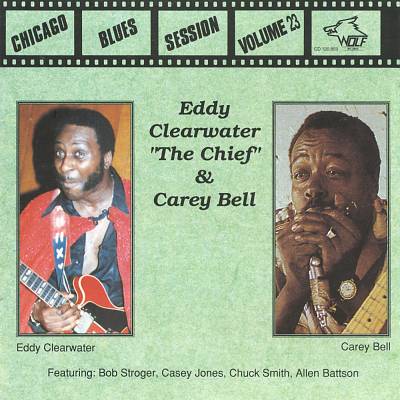
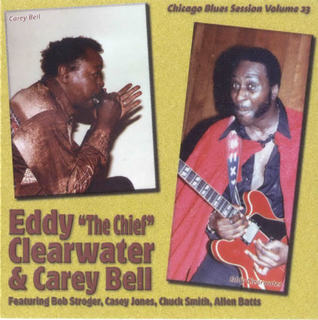
CHICAGO BLUES SESSION vol. 23
Wolf
1980
Bandes en public enregistrées à Cambridge (Massachusets) dans lesquelles les cousins Carey Bell et Eddy Clearwater partagent l'affiche. Malgré des accompagnateurs de premier choix (Allen Batts, Chuck Smith, Bob Stroger, Casey Jones), le disque peine à convaincre : une qualité sonore assez moyenne, des morceaux un peu longs, des leaders peu inspirés. Un disque assez mineur et peu intéressant.
Live tapes captured in Cambridge (Massachusetts) in which the cousins Carey Bell and Eddy Clearwater share the bill. Despite first-choice musicians (Allen Batts, Chuck Smith, Bob Stroger, Casey Jones), the disc is hardly convincing : a rather average sound quality, a bit too long songs, uninspired leaders. A relatively minor and not very interesting album.
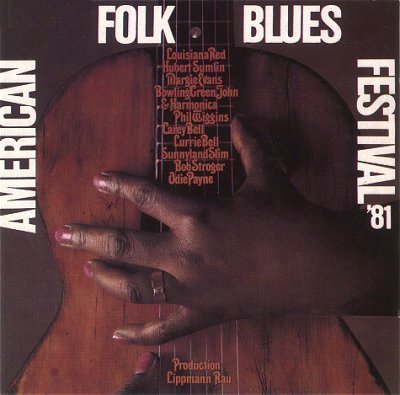
AMERICAN FOLK BLUES FESTIVAL '81
L+R
March 1981
Habitué aux tournées européennes depuis la fin des années 60, Carey rempile pour la tournée de l'American Folk Blues Festival de 1981 avec un programme très proche de l'année précédente. Cette fois, il a pris son fils Lurrie à ses côtés (chant et guitare) mais les autres musiciens restent les mêmes. Carey et son groupe accompagnent également la chanteuse Margie Evans à cette occasion. Sur le microsillon d'origine, les deux morceaux sont chantés par Lurrie (qui n'hésite pas à reprendre Magic Sam et Buddy Guy). Un titre supplémentaire, chanté par Carey, a été ajouté sur le CD ("Walking through the park").
Accustomed to european tours since the late 60's, Carey signs up for the American Folk Blues Festival 1981 tour with a very similar program than previous year. This time, he took his son Lurrie with him (vocals and guitar), but the other musicians remain the same. Carey and his band also accompanied the singer Margie Evans on this occasion. On the original LP, the two songs are sung by Lurrie (who does not hesitate to cover Magic Sam and Buddy Guy). Another title, sung by Carey, was added on the CD ("Walking through the park").
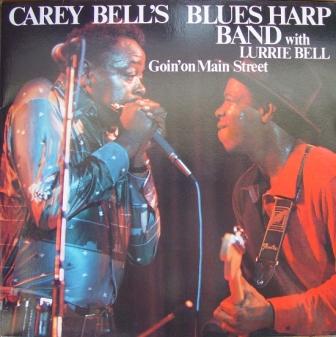
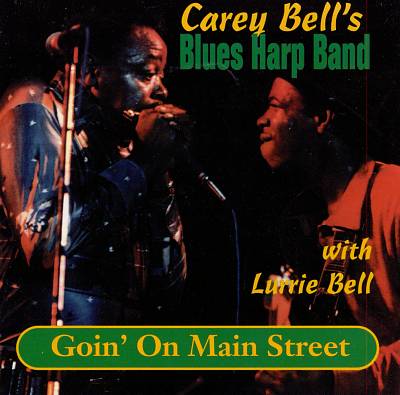
GOIN' ON MAIN STREET
L+R
Evidence
March 1981 - June 1982
Enregistré en deux jours à Chicago pour le label allemand L+R et, plus tard, repris en CD par Evidence, le disque est produit par Horst Lippmann (un des organisateurs de l'American Folk Blues Festival). Carey, toujours impérial à l'harmonica, est secondé par ses fils Lurrie et Carey Jr. Si le premier à la guitare semble parfaitement à l'aise, notamment dans le long blues "I'm worried", le second est un bassiste peu créatif et parfois approximatif. "Heartaches and pain" et "Easy to love you" sont parmi les meilleurs moments de cet excellent disque. Pour l'édition CD, les deux morceaux de l'American Folk Blues Festival 1981 chantés par Lurrie sont ajoutés en guise de bonus.
Recorded in two days in Chicago for the german label L+R and later reissued in CD by Evidence, this album is produced by Horst Lippmann (one of the promoters of the American Folk Blues Festival). Carey, always imperial harmonica, is assisted by his sons Lurrie and Carey Jr. If the first on guitar seems perfectly at ease, especially in the long blues "I'm worried", the second is a not very creative and sometimes approximate bass player. "Heartaches and pain" and "Easy to love you" are among the highlights of this excellent album. For the CD edition, the two tracks of the American Folk Blues Festival in 1981 sung by Lurrie are added as a bonus.
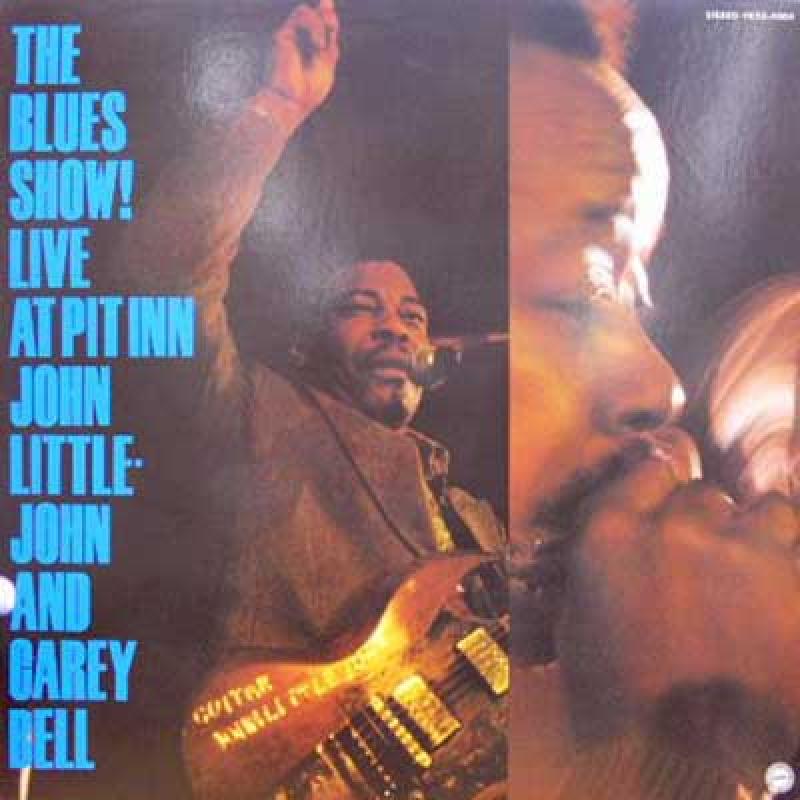
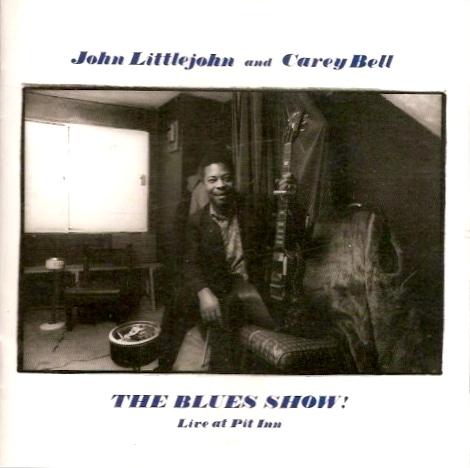
BLUES SHOW : LIVE AT THE PIT INN
Yupiteru
P-Vine
December 1981
Enregistré dans une salle japonaise, ce concert conjoint de John Littlejohn et Carey Bell retranscrit parfaitement la ferveur et la puissance du Chicago blues. Les musiciens sont tous très en forme (Larry Burton, Willie Kent et le batteur Casey Jones au jeu terriblement excitant). Carey se révèle particulièrement brillant sur la reprise du "Hoochie coochie man" de Muddy Waters. Son percutant instrumental "Carey Bell rocks" déménage vraiment et sa version de "Easy to love you" très réussie. La prise de son est réellement parfaite (ce qui est loin d'être le cas de tous les disques en public). Un album difficile à trouver mais qui vaut vraiment l'écoute.
Recorded in a japanese concert hall, this performance of John Littlejohn & Carey Bell transcribed perfectly fervor and power of Chicago blues. The musicians are all first-rate (Larry Burton, Willie Kent and drummer Casey Jones with his terribly exciting playing). Carey is particularly brilliant on "Hoochie coochie man" (by Muddy Waters). His powerful instrumental "Carey Bell rocks" really moved and his version of "Easy to love you" very achieved. The sound is really perfect (which is far from the case of all live albums). A hard to find album, but well worth listening.
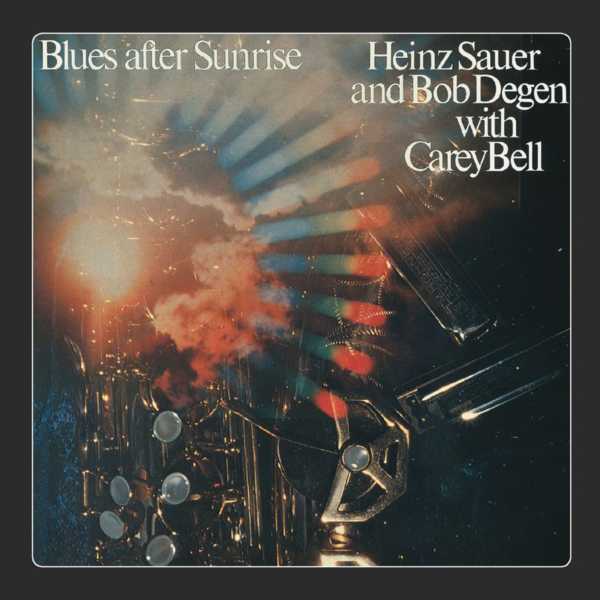
BLUES AFTER SUNRISE
L+R
September 1982
L'alliance improbable entre l'harmoniciste de blues Carey Bell, le pianiste de jazz américain Bob Degen et le saxophoniste allemand Heinz Sauer au studio Audiolab d'Oberursel (dans la banlieue de Francfort). Il s'agit d'une curiosité entre blues et jazz pas complètement désagréable. Certains moments confinent au n'importe quoi et d'autres paraissent plutôt plaisants. Il n'y a pas de vraie ligne directrice et les interventions intempestives du saxophoniste pas toujours pertinentes. Un disque partiellement raté qu'il faut conseiller uniquement aux fans inconditionnels de Carey Bell.
The unlikely alliance between blues harpist Carey Bell, american jazz pianist Bob Degen and german saxophonist Heinz Sauer at Audiolab studio in Oberursel (suburb of Frankfurt). It is a curiosity between blues and jazz not completely unpleasant. Some moments come out on anything and others seem rather pleasant. There is no real guideline and saxophonist interventions not always relevant. A partially failed album only to be advised for Carey Bell hardcore fans.
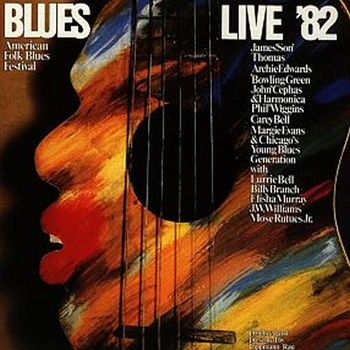
AMERICAN FOLK BLUES FESTIVAL '82
L+R
November 1982
Enième participation de Carey Bell à une tournée du célèbre festival itinérant. Cette fois, on notera deux trios d'harmonica (Carey Bell, Billy Branch, Phil Wiggins) : "Tribute to Big Walter" et "Blues harp by three". Si le premier morceau s'avère plutôt intéressant et même parfois entrainant, le second, en revanche, est parfaitement ennuyeux. L'ensemble n'a pas la fougue et la créativité des éditions précédentes et déçoit nettement.
Carey Bell umpteenth participation of the famous touring festival. This time, we note two harmonica trios (Carey Bell, Billy Branch, Phil Wiggins) : "Tribute to Big Walter" and "Blues harp by three". If the first one is rather interesting and sometimes even moving, the second one, however, is quite boring. The set does not have the passion and creativity of previous editions and clearly disappoints.
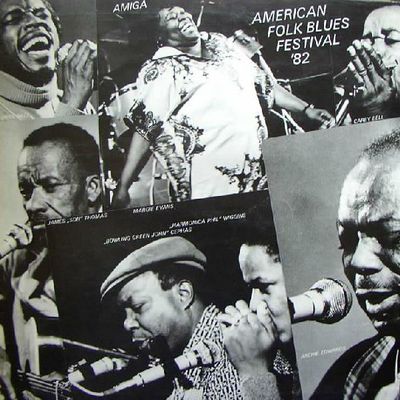
AMERICAN FOLK BLUES FESTIVAL '82
Amiga
November 1982
Un titre supplémentaire - le slow blues "Easy to love" - provenant de la tournée de l'American Folk Blues Festival.
One additional track - the slow blues "Easy to love" - coming from the American Folk Blues Festival tour.
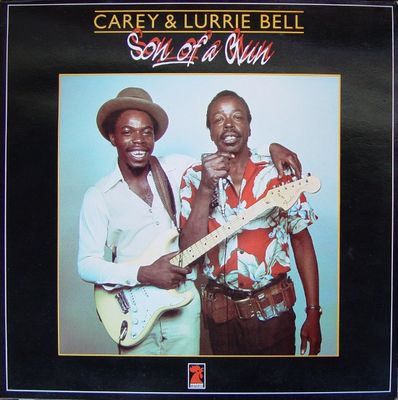
SON OF A GUN
Rooster
May 1982 - 1983
Un disque relativement plaisant et varié donnant une bonne illustration des interactions musicales entre le père (Carey) et son fils (Lurrie). Finalement, c'est même Lurrie qui tire son épingle du jeu et que l'on remarque le plus tout au long de ces séances. Contrairement à "Goin' on Main Street" où les deux hommes avaient privilégié des morceaux assez longs, ici, ils se concentrent sur des titres plus courts mais aussi plus limités.
A relatively pleasant and varied album giving a good illustration of musical interactions between the father (Carey) and his son (Lurrie). Finally, it is even Lurrie that pulls out of the game and that is most noticeable throughout these sessions. Unlike "Goin 'on Main Street" in which the two men had privileged long blues here, they focus on shorter but also more limited tracks.
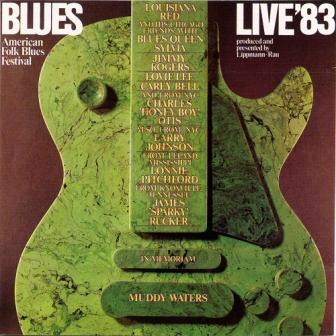
AMERICAN FOLK BLUES FESTIVAL '83
L+R
October - November 1983
Encore une fois à l'affiche de la désormais célèbre tournée, Carey est, cette fois, associé au guitariste Louisiana Red. Les deux hommes jouent successivement dans une configuration électrique puis acoustique. Carey accompagne également Queen Sylvia Embry. L'ensemble s'avère correct mais sans grand relief.
Again billed for the now famous tour, Carey, this time, is associated with the guitarist Louisiana Red. Both men play successively in electric and acoustic configuration. Carey also accompanied Queen Sylvia Embry. All is correct but without any surprise.
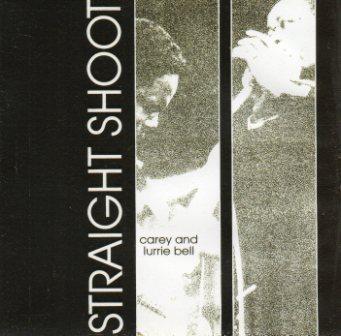
STRAIGHT SHOOT
Blues South West
September 1986
A l'occasion d'une tournée en Angleterre, Carey et Lurrie enregistrent ce disque sous la supervision du guitariste et producteur Julian Piper. Il s'agit d'un mélange de titres en studio et en public accompagné du groupe Junkyard Angels. Le son s'avère vraiment faiblard de bout en bout. De plus, ces séances ne semblent pas avoir été réellement préparées. Un ensemble anecdotique, routinier et mal enregistré.
During an english tour, Carey and Lurrie record this LP under the supervision of guitarist and producer Julian Piper. It is a mixture of tracks in the studio and in public accompanied by The Junkyard Angels. The sound turns really feeble throughout the record. In addition, these sessions do not seem to have actually been prepared. Anecdotic and poorly recorded.
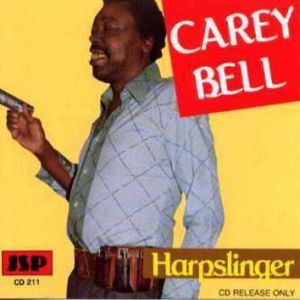
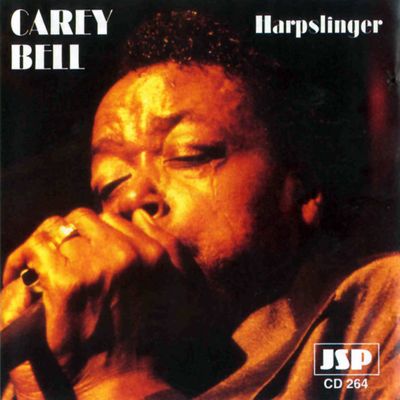
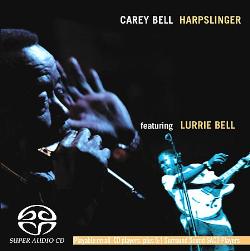
HARPSLINGER
JSP
February - April 1988
Carey et Lurrie Bell firent beaucoup d'albums pour le compte du label JSP de John Stedman. Celui-ci est le premier. Carey y est seul (c'est à dire sans son fils Lurrie) avec un groupe compétent réduit à l'essentiel : Richard Studholme (guitare), Andy Pyle (basse) et Geoff Nichols (batterie). On note quelques beaux moments comme "Pretty baby", "Blues with a feeling" et "85%". Un bon album de blues, simple et soigné, sans grande surprise mais qui vaut certainement l'écoute. Il y a huit titres dans la première édition CD et treize dans la version augmentée (des morceaux avec Lurrie notamment qui dénotent un peu avec l'album original).
Carey and Lurrie Bell made a lot of albums for the JSP label (managed by John Stedman). This is the first one. Carey is alone (i.e. without his son Lurrie) with a small but competent backing band : Richard Studholme (guitar), Andy Pyle (bass) and Geoff Nichols (drums). There are some beautiful moments such as "Pretty Baby", "Blues with a feeling" and "85%". A good blues album, simple and neat, no great surprise but definitely worth listening. There are eight titles in the first edition CD and thirteen in the enhanced version (with some Lurrie tracks very different from the original album).
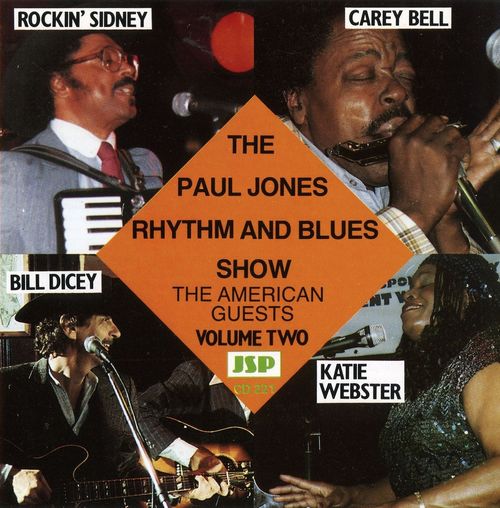
THE PAUL JONES RHYTHM AND BLUES SHOW vol.2
JSP
April 1988
Ces quatre faces ont été enregistré dans les studios de la BBC à Manchester (Angleterre). Carey Bell joue de l'harmonica seulement accompagné du guitariste anglais Richard Studholme. Une prestation plutôt quelconque.
These four sides were recorded in BBC studios in Manchester (England). Carey Bell plays harmonica accompanied only by the english guitarist Richard Studholme. A rather ordinary performance.
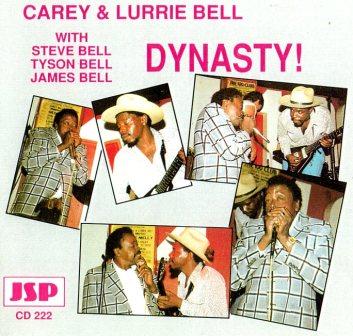
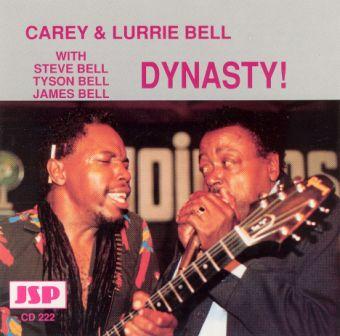
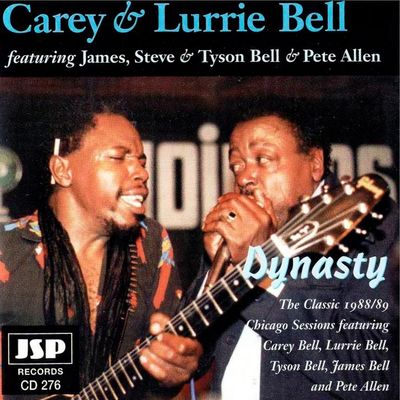
DYNASTY
JSP
1988 - 1989
Cette fois, toute la famille Bell s'est retrouvée au studios Soto Sound de Chicago pour ce disque. Carey, le paternel, est toujours le chanteur et harmoniciste mais il est accompagné de ses fils Lurrie (voix, guitare), Steve (harmonica), Tyson (15 ans, basse) et James (17 ans, batterie). Ce petit orchestre familial est agrémenté des collaborations du guitariste Pete Allen (ancien membre des Teardrops de Magic Slim) et de l'organiste Jerry Soto. Dans une belle variété de styles et de tempos, ils livrent un bon set de Chicago Blues sans fausse note. On remarque "What my mama told me", "I'll be your 44", "The Gladys shuffle", "Second hand man" et le long "I don't need no woman". Il y neuf morceaux dans la version originale, quatorze dans la version augmentée.
This time, the entire Bell family joined together at Soto Sound Studios in Chicago for this record. Carey, the father, is still the singer and harmonica player but he is accompanied by his son Lurrie (vocals, guitar), Steve (harmonica), Tyson (15 years old, bass) and James (17 years old, drums). This small family band is enhanced by collaborations of guitarist Pete Allen (former member of Magic Slim's Teardrops) and organist Jerry Soto. In a great variety of styles and tempos, they deliver a good set of a flawless Chicago blues. We can point out "What my mama told me", "I'll be your 44", "The Gladys shuffle", "Second hand man" and long "I don't need no woman". There are nine tracks in the original version, fourteen in the expanded version.
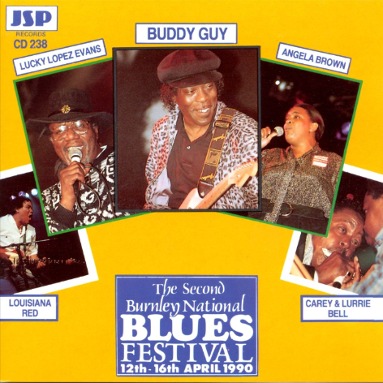
SECOND BURNLEY BLUES FESTIVAL
JSP
April 1990
Ce disque édité par JSP relate le festival de blues de Burnley (au nord de Manchester). Carey & Lurrie Bell y prennent deux titres en leader accompagnés de Tyson (basse) et James (batterie). La famille Bell accompagne aussi d'autres artistes à l'affiche comme Buddy Guy et Louisiana Red sur ce disque.
This disc issued by JSP relates the Burnley Blues Festival (north of Manchester). Carey & Lurrie Bell take here two titles as leaders with Tyson (bass) and James (drums). The Bell family also accompanied other artists on stage as Buddy Guy and Louisiana Red on this album.
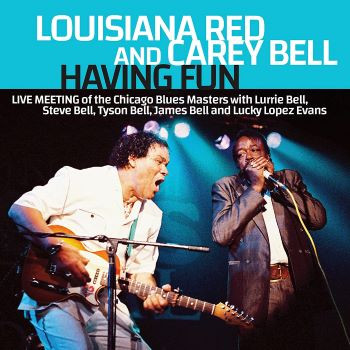
HAVING FUN
JSP
April 1990
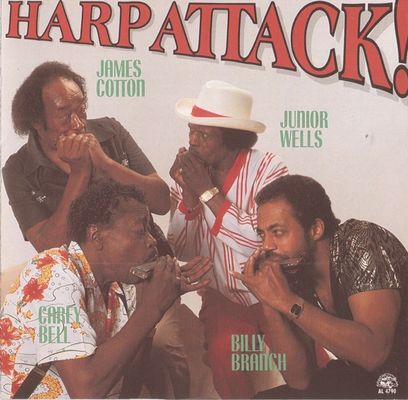
HARP ATTACK
Alligator
Spring - Summer 1990
Quatre grands noms de l'harmonica blues rassemblés au Streeterville Studios de Chicago par Bruce Iglauer pour une réunion fantastique. Carey apparait, d'abord, sur le titre d'ouverture "Down home blues", un peu convenu, où chacun prend consciencieusement son couplet et son solo. On le retrouve, ensuite, sur le superbe "My eyes keep me in trouble" puis sur deux de ses compositions : "Hit man" et "Second hand man". Un groupe cinq étoiles est chargé d'accompagner ces vénérables souffleurs : Michael Coleman, Lucky Peterson, Johnny B. Gayden et Ray "Killer" Allison. Au final, une grande réussite qui obtint un grand retentissement public et critique et gagna plusieurs prix.
Four big names of blues harmonica gathered together at Streeterville Studios in Chicago by Bruce Iglauer for a fantastic session. Carey appears, first, on the opening "Down home blues", sometimes conventional, where each artist dutifully takes his verse and his solo. Then, we find him on the beautiful "My eyes keep me in trouble" and two of his compositions : "Hit man" and "Second hand man". An all-stars backing band is fully competent for supporting these venerable blowers : Michael Coleman, Lucky Peterson, Johnny B. Gayden and Ray "Killer" Allison. In the end, a great achievement which won a great public and critical acclaim and won several awards.
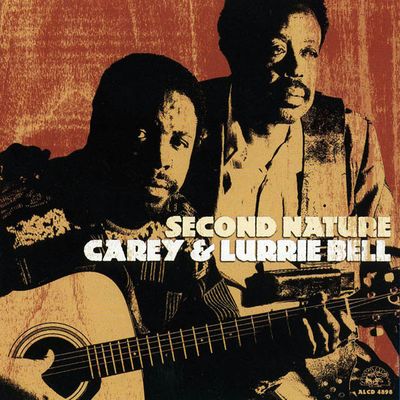
SECOND NATURE
Alligator
January 1991
Cette session acoustique a été mise en boite lors d'une tournée en Finlande par Chip Covington et Martti Heikkinen. Selon les notes de pochette, il n'y eut ni répétition, ni overdubs. La spontanéité à l'état brut. Une séance intimiste et appliquée où les deux musiciens sont à égalité, se répondant parfaitement sans jamais prendre le dessus sur l'autre (ils sont rejoints sur deux morceaux par James Bell aux percussions). Dommage qu'il ait fallu attendre 2004 pour découvrir cet opus original. "Road is so long", "Short dress woman", "Five long years" et "Heartaches and pain" sont parmi les meilleurs moments de ce disque.
This acoustic session was captured during a tour in Finland by Martti Heikkinen and Chip Covington. According to the liner notes, there was no rehearsal, no overdubs. Just rough spontaneity. An intimate and applied session where the two musicians are equal and in perfect adequacy (they are joined on two tracks by James Bell on percussion). Too bad it took until 2004 to discover this original album. "Road is so long", "Short dress woman", "Five long years" and "Heartaches and pain" are among the highlights of this disc.
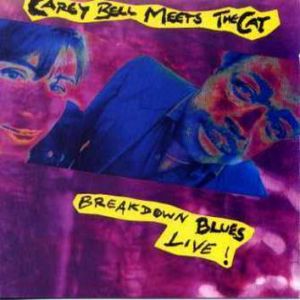
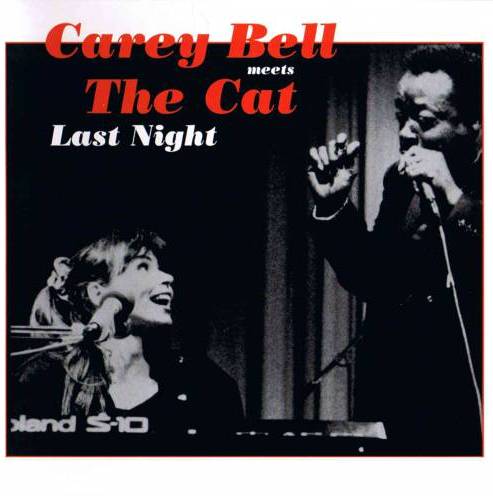
BREAKDOWN BLUES LIVE
CMA
CAREY BELL MEETS THE CAT LAST NIGHT
Chrisly
October 1991
Capté lors d'un concert allemand par Siegfried Christmann, ce disque présente la rencontre entre Carey Bell et The Cat une pianiste allemande (excellente pianiste mais chanteuse limitée). Curieusement, le groupe ne comprend aucun guitariste. Heureusement, les deux leaders sont en forme et occupent parfaitement l'espace. On note également le jeu de batterie discret et attentif de James Bell qui participe à la cohésion de l'ensemble. Le programme est, malgré tout, inégal mais "Short dress woman" et "Brought up the hard way" sortent du lot par leur dynamisme.
Captured during a german concert by Siegfried Christmann, this album presents the encounter between Carey Bell and The Cat, a german pianist (excellent pianist but limited singer). Curiously, the group does not include any guitarist. Fortunately, the two leaders are perfectly in condition and occupy space. We note also the discreet and attentive drummer James Bell involved in the cohesion of the whole. The program is nevertheless uneven, but "Short dress woman" and "Brought up the hard way" stand out by their dynamism.
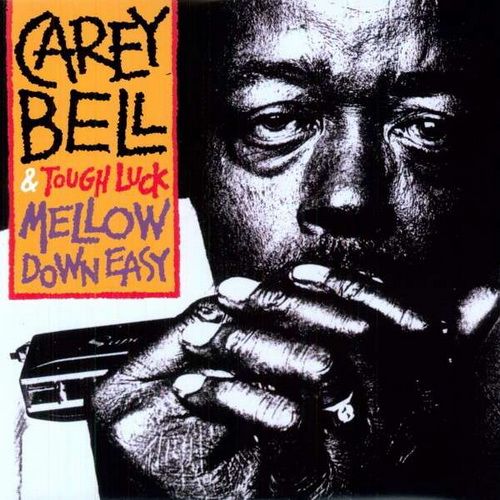
MELLOW DOWN EASY
Blind Pig
1991
Le groupe Tough Luck, originaire du Maryland, a été choisi par Carey pour l'accompagner sur scène dès 1988. Le quartet est composé de Steve Jacobs (guitare), Brian Mac Gregor (basse), Mark "Lips Lackowitz" Hurwitz (harmonica) et Buddy Grandell (batterie). Une formation compétente et assez peu expansive, ce qui laisse toute la place disponible au leader. Deux nouvelles compositions sont sorties de ces séances : un magnifique "Delta time" à deux harmonicas et "Big Walter strut" en hommage à Big Walter Horton. Le reste de l'album est composé en majorité de reprises parfois excellentes comme "Mellow down easy" ou les calmes et pleins de feeling "Saint Louis blues" et "Walking by myself". Mention aussi à sa remarquable version de "So easy to love you".
Tough Luck , a band from Maryland, was chosen by Carey to accompany him on stage since 1988. The quartet is composed of Steve Jacobs (guitar), Brian Mac Gregor (bass), Mark "Lips Lackowitz" Hurwitz (harmonica) and Buddy Grandell (drums). A competent and truly discreet band, which leaves room available to the leader. Two new compositions came out of these sessions : a beautiful "Delta time" with two harmonicas and "Big Walter strut" in tribute to Big Walter Horton. The rest of the album is mostly made up of some great covers such as "Mellow down easy" or the quiet and delicate "St. Louis blues" and "Walking by myself". Mention also to his remarkable version of "So easy to love you".
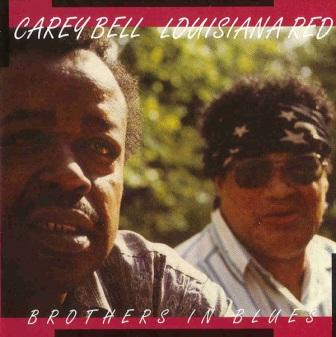
BROTHERS IN BLUES
CMA
April 1993
Gravé à Cologne (Allemagne) en compagnie de Louisiana Red, cet album est le reflet d'une séance acoustique réalisée par Rolf Schubert. Le guitariste prend la majeure partie du chant ne le laissant à Carey Bell que sur trois morceaux. L'album, un peu routinier, manque cruellement de flamme et ne décolle jamais vraiment. Les deux artistes ont déjà fait beaucoup mieux dans ce domaine.
Cut in Cologne (Germany) with Louisiana Red, this album capture an acoustic session conducted by Rolf Schubert. The guitarist takes most of the song and leaving Carey Bell sing on three tracks. The album sorely lacking flame and never really takes off. Both artists have done much better in this acoutic style.
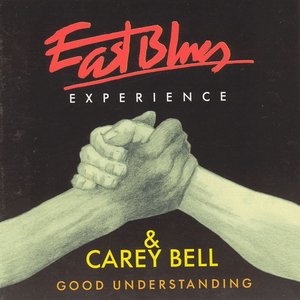
GOOD UNDERSTANDING
Concertbüro Sänze
November 1993
Album en commun avec la formation de blues-rock allemande East Blues Experience. Musicalement, on entend ici un groupe parfois confus (une guitare insupportable) au sein duquel Carey a du mal à émerger. Dans ce marasme, quelques rares moments sont plaisants ("It's so easy to love you", "Leavin' in the morning") mais l'inepte "Carey's new friend" est ridicule à souhait.
Joint album with german blues-rock band East Blues Experience. Musically, we can hear a sometimes confusing group (unbearable guitar) in which Carey struggling to emerge. In this slump, few moments are pleasant ("It's so easy to love you", "Leavin' in the morning") but the inept "Carey's new friend" is perfectly ridiculous.
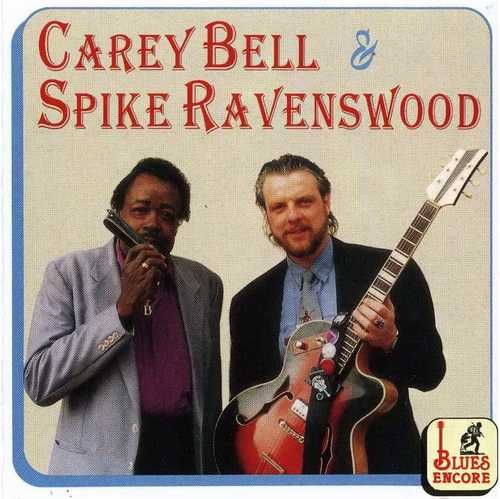
CAREY BELL & SPIKE RAVENSWOOD
Blues Encore
November 1993 - January 1994
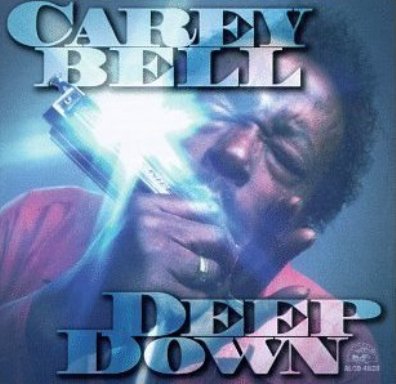
DEEP DOWN
Alligator
Spring 1994
Les répétitions et les enregistrements ont lieu pendant le printemps 1994 au Streeterville Studios de Chicago. Parfaitement co-produit par Bell, Bruce Iglauer et Scott Dirks, le disque présente Carey entouré de superbes musiciens comme Carl Weathersby, Lurrie Bell et Lucky Peterson (particulièrement brillant aux claviers). Il se dégage de ce disque remarquable une énergie irrésistible. Quelques reprises bien troussées comme "I got to go" de Little Walter, "After all" de Sonny Boy Williamson et "Easy" de Big Walter Horton mais le reste du programme est à l'avenant : "Let me stir in your pot", "Low down dirty shame", "I got a rich man's woman" (avec Carl Weathersby faisant de la slide avec son briquet Bic si l'on en croit les notes de pochette), "Must I holler" ainsi que le bouillant instrumental "Jawbreaker" où se distingue, encore une fois, son jeu virtuose à l'harmonica chromatique.
Rehearsals and recordings take place during the spring of 1994 at Streeterville Studios in Chicago. Perfectly co-produced by Bell, Bruce Iglauer and Scott Dirks, this album shows Carey surrounded by superb musicians like Carl Weathersby, Lurrie Bell and Lucky Peterson (particularly brilliant on keyboards). It emerges from this remarkable opus an irresistible energy. Some well achieved covers like "I got to go" (by Little Walter), "After all" (by Sonny Boy Williamson) and "Easy" (by Big Walter Horton) but the rest of the program is of the same quality : "Let me stir in your pot", "Low down dirty shame", "I got a rich man's woman" (with Carl Weathersby making slide with his Bic lighter according to the liner notes), "Must I holler" and the boiling instrumental "Jawbreaker" in which stands, once again, his virtuoso playing on chromatic harmonica.
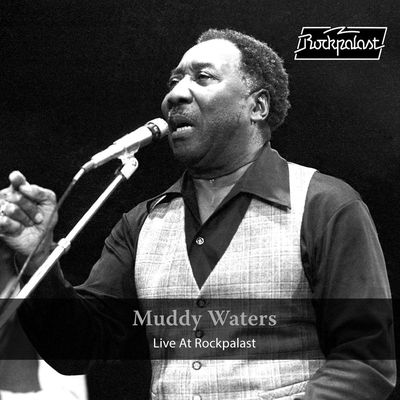
LIVE AT ROCKPALAST
MIG Music
June 1996
Sur le second CD, on trouve un concert intéressant du Muddy Waters Tribute Band au sein duquel Carey joue et chante quelques morceaux.
On the second CD, there is an interesting concert by the Muddy Waters Tribute Band in which Carey plays and sings a few songs.
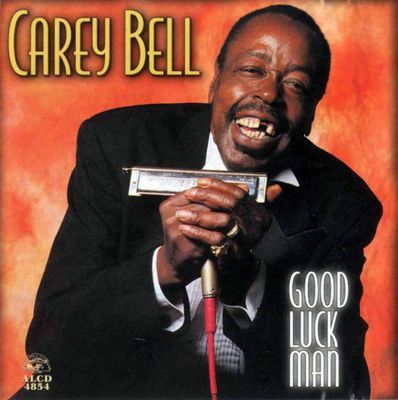
GOOD LUCK MAN
Alligator
1997
Pour ce second opus chez Alligator, Carey a tenu à s'assurer les services de son fidèle guitariste Steve Jacobs qui l'accompagne depuis plusieurs années (il est également co-producteur). L'équipe de musiciens est compétente mais pas toujours bien inspirée. Un peu inférieur à "Deep down", cet opus n'en est pas moins une réussite notable : sa reprise de "My love strikes like lightning" est particulièrement aboutie, l'excitant instrumental "Bell hop" met en exergue ses talents d'harmoniciste sur tempo rapide. Les autres morceaux sympathiques, jamais médiocres, constituent un bel ensemble varié. Mais, on ne retrouve jamais la créativité et l'inventivité de l'album précédent.
For this second installment in Alligator, Carey was keen to secure the services of his regular guitarist Steve Jacobs accompanying several years (he is also co-producer). The musicians team is competent but not always well advised. A little inferior to previous "Deep down", this album is, however, a significant success : his cover of "My love strikes like lightning" is particularly accomplished, the exciting instrumental "Bell hop" highlights his talents as harpist on fast tempo. The other tracks are nice, never poor, and constitute a good varied set. But we never found the creativity and inventiveness of the previous album.
SUPERHARPS II
Telarc
2001
Organisée par le label Telarc et Randy Labbe, cette réunion d'harmonicistes surfe sur le succès du premier épisode de 1999. Les quatre souffleurs rassemblés sont Carey Bell, Raful Neal, Snooky Pryor et Lazy Lester. En ce qui concerne Carey, il prend trois morceaux, honnêtes et sans surprise, en vedette ainsi qu'un titre où il accompagne Snooky Pryor (l'excellent "Keyhole in your door"). Le morceau final "Harp to harp" rassemble les quatre leaders qui prennent chacun leur solo.
Organized by the Telarc label and Randy Labbe, this harmonicist meeting riding on the success of the first episode of 1999. The four blowers gathered are Carey Bell, Raful Neal, Snooky Pryor and Lazy Lester. Regarding Carey, he takes three tracks, honest and unsurprising, and he accompanies Snooky Pryor (the excellent "Keyhole in your door"). The final track "Harp to harp" brings together the four leaders who each have their solo.
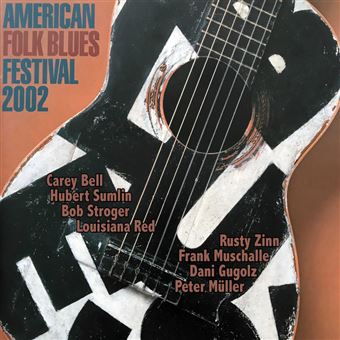
AMERICAN FOLK BLUES FESTIVAL 2002
Black & Blue
August - September 2002
Tournée hommage de l'American Folk Blues Festival pour célébrer les 40 ans de la première tournée de 1962. Carey Bell chante sur trois titres de pur Chicago Blues bien accompagné par Rusty Zinn, Frank Muschalle, Dani Gugolz et Peter Müller.
Tribute tour of the American Folk Blues Festival to celebrate the 40th anniversary of the first tour in 1962. Carey Bell sings on three tracks of pure Chicago Blues well accompanied by Rusty Zinn, Frank Muschalle, Dani Gugolz and Peter Müller.
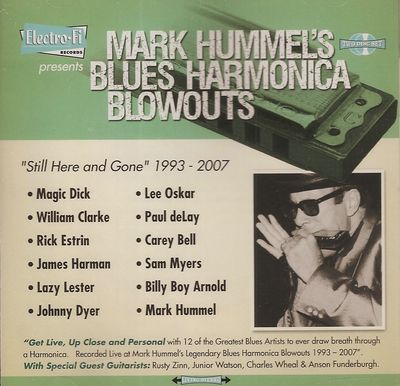
MARK HUMMEL'S BLUES HARMONICA BLOWOUTS
Electro-Fi
?
Il s'agit d'un des CDs publiés à l'occasion des tournées organisées par Mark Hummel réunissant les meilleurs harmonicistes. Sur celui-ci, on peut entendre un morceau de bonne facture joué par Carey Bell : "I got to go".
This is one of the CDs published on the occasion of the tours organized by Mark Hummel bringing together the best harmonica players. On it, you can hear a fine track performed by Carey Bell : "I got to go".
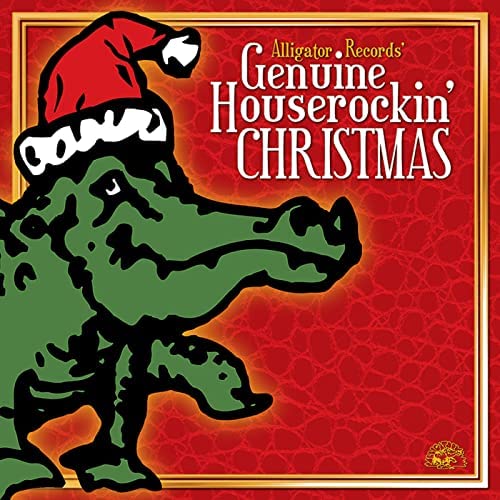
GENUINE HOUSEROCKIN' CHRISTMAS
Alligator
2003
Pour cet album de Noël, Carey propose le puissant "Christmas train".
For this christmas album, Carey offers the powerful "Christmas train".
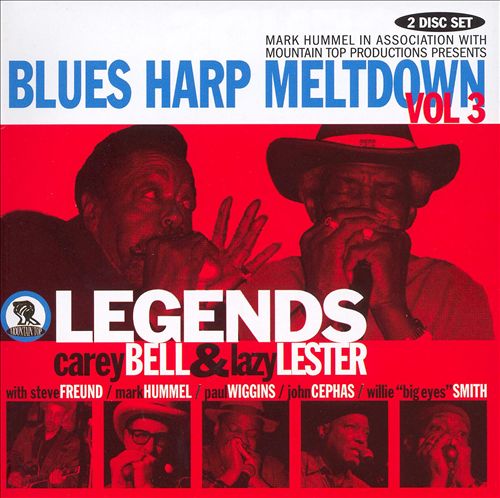
BLUES HARP MELTDOWN vol.3
Mountain Top
January 2004
Mark Hummel a rassemblé sur la scène du Moe's Alley (à Santa Cruz, Californie) quelques grands harmonicistes de blues. Carey Bell figure à l'affiche de ce superbe concert. Accompagné d'un excellent groupe, il délivre une superbe prestation parfaitement à l'aise au chant et impérial à l'harmonica. De belles lectures de "Dirty shame", "It ain't right", "I'm ready" et de "One day".
Mark Hummel assembled on Moe's Alley stage (in Santa Cruz, California) some great blues harmonicists. Carey Bell is featured on this great concert. Accompanied by an excellent backing band, he delivers a superb performance perfectly at ease with the singing and imperial on harmonica. Beautiful readings of "Dirty shame", "It ain't right", "I'm ready" and "One day".
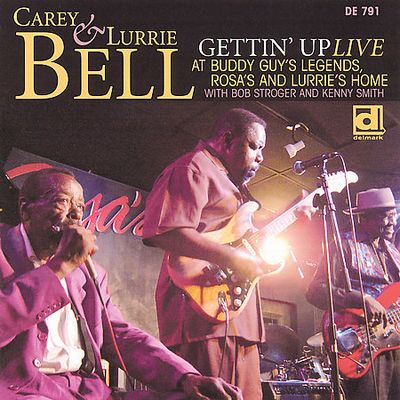
GETTIN' UP
Delmark
July - October 2006
Après une attaque cardiaque dans sa maison de Charlotte (Caroline du nord), il chute et se casse à la hanche. Hospitalisé pendant quatre semaines, Carey n'est pas sorti depuis trois jours qu'il rejoint son fils Lurrie sur scène. Ce disque recueille trois performances distinctes : un concert au Rosa's Lounge en juillet 2006, un autre au Buddy Guy' Legends en octobre de la même année, ainsi qu'une petite séance intimiste et improvisée prise au domicile de Lurrie le lendemain du concert au Rosa's Lounge. Malgré ses soucis de santé, ses possibilités au chant et à l'harmonica sont demeurées intactes. Il est remarquable du début à la fin, tout comme Lurrie, brillant de bout en bout à la guitare. Il s'agissait, alors, de ses dernières prestations scéniques puisque Carey s'est éteint en mai 2007.
After a heart attack at his Charlotte home (North Carolina), he falls and breaks his hip. Hospitalized for four weeks, Carey did not come out for three days when he joined his son Lurrie on stage. This album collects three separate performances : a concert at Rosa's Lounge in july 2006, another at Buddy Guy's Legends in october of the same year, and a small and intimate improvised session at Lurrie's home, the day after the concert at Rosa's lounge. Despite his health problems, his vocals and harmonica competencies remained intact. He is remarkable from beginning to the end, and Lurrie is brilliant from start to finish on the guitar. It was, then, his last live performances since Carey died in may 2007.